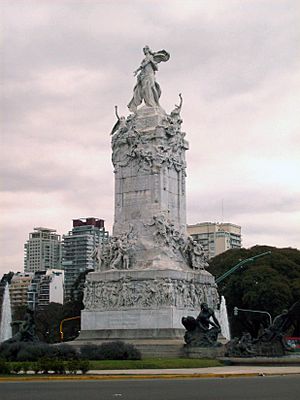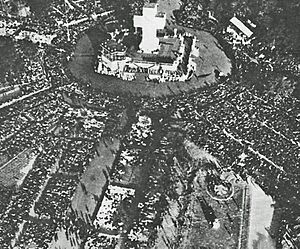Monument to the Carta Magna and Four Regions of Argentina facts for kids
The Monument to the Carta Magna and Four Regions of Argentina is a famous landmark in Buenos Aires, Argentina. You can find it where Del Libertador and Sarmiento Avenues meet. Most people just call it the Monument of the Spanish.
This beautiful monument was a gift from the Spanish community. It celebrated 100 years since the May Revolution of 1810. This event was the start of Argentina's journey to become independent from Spain. The monument is made from strong bronze and white Carrara marble. It was finally finished in 1927.
History of the Monument
This monument is one of the most well-known in Buenos Aires. Its first stone was placed in 1910. A designer named Agustí Querol Subirats started the project. However, he passed away soon after. This caused many delays in building the monument.
After Querol's death, another designer, Cipriano Folgueras, took over. But he also died, which delayed the work even more. Antonio Moliné later finished the project. There were other problems too. Italian workers went on strike at the marble quarries. Also, a big storm on September 20, 1914, damaged part of the monument. The storm broke the left arm of a marble statue, and it had to be fixed.
Another sad event happened in 1916. The ship carrying materials for the monument sank in the ocean. This ship was called the Príncipe de Asturias. Spain had to ask for new materials. These arrived two years later but got stuck in customs. This caused more paperwork and delays.
Finally, the amazing monument was ready. It stands about 24.5 meters (80 feet) tall. The monument was officially opened on March 13, 1927. The president of Argentina at the time, Marcelo T. de Alvear, gave a speech.
In 1934, a very important event happened near the monument. It was the closing of the International Eucharistic Congress. For this event, a huge cross, 35 meters (115 feet) tall, was placed over the monument. After a special Mass, over a million people were there. They heard Pope Pius XI bless them through loudspeakers. This blessing was broadcast live from the Vatican. Cardinal Eugenio Pacelli, who later became Pius XII, led the event.
What the Monument Looks Like
At the very top of the monument, there is a statue that stands for the Republic. At its base, you can see marble statues that represent hard work and labor. There are also bronze figures. These figures stand for the four main regions of Argentina: the Andes mountains, the Pampa plains, the Chaco region, and the Río de la Plata area.
The monument also has special messages carved into it. One part is from the Argentine constitution. It says that Argentina offers freedom to its people and to anyone from around the world who wants to live there. There are also four statements that talk about the strong friendship between Argentina and Spain. They mention their people, their language, and their shared future.
Where to Find It
The monument is located in the Palermo Gardens. It is at the meeting point of Del Libertador and Sarmiento Avenues. It is also right in front of the Buenos Aires Zoo.
Gallery
See also
 In Spanish: Monumento de los españoles para niños
In Spanish: Monumento de los españoles para niños
 | Selma Burke |
 | Pauline Powell Burns |
 | Frederick J. Brown |
 | Robert Blackburn |











